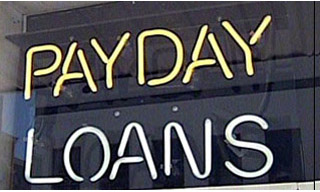Tag Archives: CFPB
California Advocates Take to Capitol Hill to Urge Lawmakers to Keep Consumers Safe

California, Join in Opposition to Shuttering of Consumer Financial Protection Bureau and Warn that Efforts to Undermine Would Leave Millions Exposed to Fraud and Ripoffs FOR IMMEDIATE RELEASE: March 10, 2025 Sacramento, CA – This week, hundreds of consumer advocates and concerned voters from 45 States and the … Read More ›
Statement of Consumer Federation of California’s Executive Director Robert Herrell on the United States Supreme Court’s Decision in Consumer Financial Protection Bureau v. Community Financial Services Assn. of America, Ltd.:

“The Consumer Federation of California (CFC) is pleased that, on a 7-2 vote, the United States Supreme Court has held that the financing structure of the federal Consumer Financial Protection Bureau (CFPB) is legal and constitutional. By rejecting the spurious arguments of the payday lenders and those … Read More ›
CFPB Has Handled 1 Million Consumer Complaints

Five years in and a million complaints down. That is the story the CFPB is putting out today — since having been founded in 2011, the Consumer Finance Protection Bureau has handled over one million consumer complaints, a milestone they sailed past earlier this month. Read More ›
Forced Arbitration: A Sneaky Rip-Off

Update: The CFC submitted a letter in strong support of the proposed rule to the Consumer Financial Protection Bureau on August 22. View it here (pdf). When a bank or other financial institution engages in unfair, deceptive or downright abusive rip-offs, consumers should get their day in … Read More ›
9-In-10 Big Banks Strip Customers Of Their Right To Jury Trial
by Chris Morran, Consumerist

Researchers at the Pew Charitable Trusts … looked at the customer contracts for checking accounts at 44 of the nation’s largest banks and found that 91% of them include jury trial waivers. Read More ›
New Rules Aim To Protect Widowed Homeowners From Foreclosure
by Andrew Khouri, Los Angeles Times

The rules, which expand and clarify existing guidance from the agency, were long awaited by consumer groups that are pushing similar regulations in a pending California Senate bill. Read More ›
From Credit Cards To Mail-Order Steaks: 87 Companies That Are Taking Away Your Right To Sue
by Chris Morran, Consumerist

A recent study by the Consumer Financial Protection Bureau found that even though most Americans have at least one financial product — checking accounts, credit cards, loans, investment accounts — that use forced arbitration clauses to strip the account-holder of their right to sue, very few of us know about these restrictions or understand what they mean. Read More ›
Can You Afford That Payday Loan? Feds Say Lenders Should Ask
by James Rufus Koren, Los Angeles Times

At the heart of the Consumer Financial Protection Bureau proposal is a requirement that lenders determine that a borrower has the ability to repay. Read More ›
The 3 Myths Banks Are Using To Defend Their ‘Get Out Of Jail Free’ Cards
by Chris Morran, Consumerist

Very few lawyers will take on a single consumer’s arbitration dispute because it’s not worth their time. Some arbitration clauses also force the customer into arbitrating their case in a specific venue, so you could have to travel all the way across the country for the possibility of minimal rewards. Arbitration also sets no legal precedent, so even if one customer prevails, another customer might fail using the exact same evidence. Read More ›
Why More Widowed Homeowners Are Struggling To Prevent A Foreclosure
by Andrew Khouri, Los Angeles Times

The state Senate Judiciary Committee [voted] Tuesday on a bill designed to give surviving spouses, domestic partners and children the same protections borrowers have in the Homeowner Bill of Rights, including the right to sue to stop a foreclosure or for economic damages after one occurs. The bill, SB-1150 … would prevent servicers from moving forward with a foreclosure before requesting “reasonable” documentation of the borrower’s death and the identity of the survivor. Read More ›
Online Payday Lenders Could Be Worse Than Traditional Payday Lenders
by Ashlee Kieler, Consumerist

Half of online payday loan borrowers incur an average of $185 in bank penalties because at least one debit attempt by lenders creates an overdraft or fails completely. … In addition to simply extracting money from borrowers’ accounts when payments are due, [the online system] allows lenders to attempt multiple debit transactions against borrowers’ accounts when the first attempt fails. Nearly 18% of borrowers experience multiple failed requests on the same day from the same lender. For an already financially strapped borrower, this can lead to hundreds of dollars’ worth of overdraft fees. Read More ›
Online Lenders Drawing More Scrutiny By Regulators
by James Rufus Koren, Los Angeles Times

Both the state Department of Business Oversight and the [U.S. Consumer Financial Protection Bureau] have turned their attention to so-called marketplace or peer-to-peer lenders — online firms that offer loans to consumers and small businesses, then sell those loans to investors. There are now dozens of such lenders, which use online applications and speedy underwriting systems to issue loans. … That growth has attracted the attention of consumer advocates, who are concerned about how lenders protect customer data and whether they comply with state and federal lending laws. Read More ›
Overdraft Practices Continue To Gut Bank Accounts And Haunt Customers
by Michael Corkery and Jessica Silver-Greenberg, New York Times

The nation’s big consumer banks collected about $11 billion in overdraft fees last year, which accounted for 8 percent of their profits, according to a report by the Consumer Financial Protection Bureau. … Many customers end up confused by how overdrafts work. In their marketing materials, for example, banks present the choice of whether to sign up for overdraft as an offer of “overdraft protection” — a feature many customers thought would automatically deny transactions and shield them from incurring the fees at all. In reality, it is a service authorizing the banks to charge the overdraft fees. Read More ›